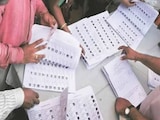There are memorials to war heroes, to men and women of distinguished service, to those who make the ultimate sacrifice for humankind, to victims of the Holocaust. There are also half a dozen memorials to those killed in the Spanish Flu of a hundred years ago but none so far for those who fell to COVID-19.
That has just changed. An online memorial has been set up on January 30 by an NGO in Kolkata as a place to come and remember those who lost their lives to the virus and share stories of love, longing and the most difficult goodbyes the survivors have had to say to those who didn't make it.
"Passed away in absolute solitude with not a single person to accompany him in his last journey! Can there be anything more miserable, tragic and dismal than this," wrote a daughter of the death of her father Sandip Kumar Roy on 17 July 2020.
The daughter, who did not share her name on the memorial, spoke for thousands of bereaved families who were never able to say goodbye to their loved ones because of Covid protocols that did not let family to meet Covid patients in hospital, nor attend the last rites upon death.
"I did crack IIT PhD entrance as you always wanted. I practice boxing and play badminton but I miss you," wrote Gopa Banerjee's "Best Friend Abhishek Kumar Dubey". She died on July 21, 2020.
"My chest is getting heavier, but I want to live". Those, recalls her daughter in her tribute on the website, were the last words of her mother Malabika Chakraborty who died on 23 October 2020.
The website, www.nationalcovidmemorial, is bringing catharsis. Dozens of memorials have poured in over the last one week, an outpouring grief that has been denied a closure.
One of the memorial's founders Dr Abhijit Chowdhury, who is also a professor at Bengal's premier state run Institute of Post Graduate Medical Education & Research, feels the country collectively owes this remembrance to the more than one and a half lakh people who died in India of COVID-19.
"Grief is a very personal thing. Many are still numb under the ice of loss. Time could heal and so could keeping their loved ones in front of their eyes in this sort of online cemetery," Dr Chowdhury said. The NGO Covid Care Network (CCN) that is steering the memorial, has an advisory panel of eminent persons from across the country to ensure rigourous checks and privacy.
"We want to reach out to tech challenged and marginalised people who also lost loved ones to Covid," he added. "That is proving a challenge."
Another reason for the memorial is to record the pandemic for posterity, not only to remember those lost but also take lessons from it for the future.
Satyarup Siddhanta, secretary of the NGO CCN steering the memorial says, "People who left us in this pandemic are not just another number in the death counter, it is very sensitive. They were never supposed to leave us at the time they left. Many couldn't even see or touch the person for the last time. Moreover the family couldn't share the grief with relatives due to the distancing. This is an attempt to bring out their emotions and share the grief among all."
Many historians worldwide have noted "a collective amnesia" about the Spanish Flu of 1918 and how it left the world unprepared for Covid 19. One of the possible reasons was, the flu coincided with the Second World War and though many more millions died in that epidemic than in the war, the flu was overshadowed, at least in Europe, by the victory on the battlefield.
"We remember them (the victims) individually, not collectively," science writer Laura Spinney was quoted saying. "Not as a historical disaster, but as millions of discrete, private tragedies." She has recently written a book on the Spanish Flu called Pale Rider: The Spanish Flu of 1918 and How it Changed the World.
The National Covid Memorial is an attempt to turn COVID-19 from lakhs of private tragedies into a historical disaster, lest we forget.















